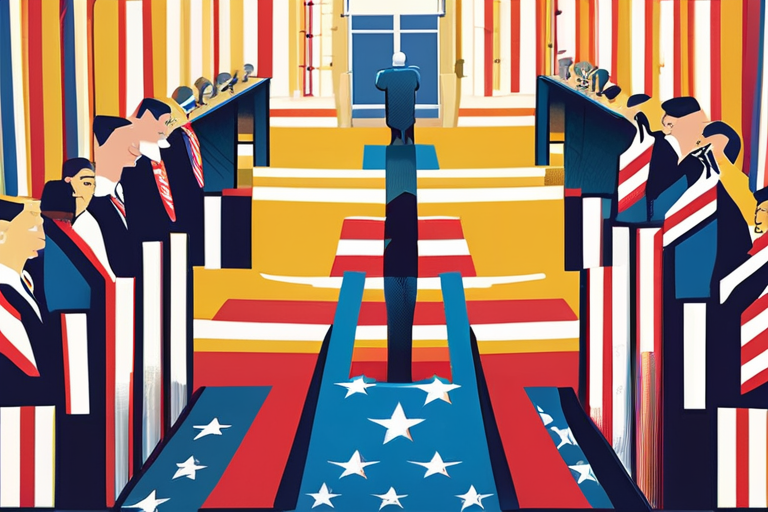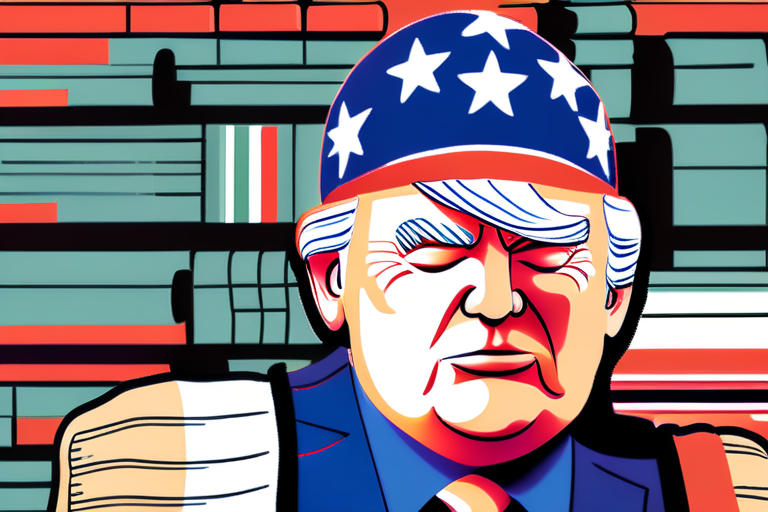The Slippery Slope to Authoritarianism: A Cautionary Tale of America's Democratic Erosion
In the sweltering Arizona desert, a somber crowd gathered at State Farm Stadium on September 21, 2025, to pay their respects to Charlie Kirk, a conservative commentator and founder of Turning Point USA. As President Donald Trump took the stage, his words were laced with a sense of nostalgia and a hint of menace. The event was a poignant reminder that the line between democratic norms and authoritarianism is perilously thin.
In the weeks leading up to Kirk's memorial service, the Trump administration had taken a series of steps that sent shockwaves through the media and politics. Late-night host Jimmy Kimmel, known for his biting satire and sharp wit, found himself under pressure from the White House to tone down his criticism. The incident sparked a heated debate about the limits of free speech in America and the role of the government in regulating the airwaves.
For Zack Beauchamp, a senior correspondent at Vox, this was more than just a skirmish between the executive branch and the media. It was a harbinger of a more insidious threat to American democracy: the gradual erosion of democratic norms and institutions. "The Trump administration has been pursuing a policy agenda that threatens our democracy," Beauchamp explained in an interview with Today, Explained. "But what's changed recently is that they seem to have gotten a lot more serious about consolidating power."
So, how does this happen? How do democracies slide into authoritarianism without anyone noticing the warning signs? To understand this process, we need to delve into the world of democratic theory and explore the mechanisms by which governments can gradually undermine their own institutions.
The Slippery Slope
In 1957, German philosopher Hannah Arendt wrote about the "banality of evil," where ordinary people become complicit in atrocities through a series of small, incremental steps. Similarly, authoritarianism often emerges as a gradual process, rather than a sudden coup d'état. This is known as the "slippery slope" theory.
The slippery slope model suggests that democratic erosion occurs when governments exploit existing weaknesses and vulnerabilities to gradually accumulate power. This can happen through various means, such as:
1. Media manipulation: Governments can use propaganda and disinformation to shape public opinion and silence dissenting voices.
2. Election interference: Authoritarian regimes often manipulate electoral processes to ensure their own victory or suppress opposition.
3. Judicial capture: Governments can pack courts with loyalists or undermine the independence of the judiciary to consolidate power.
In America's case, Beauchamp points out that the Trump administration has been using these tactics to stack the deck in favor of the Republican Party. "They've taken credible steps toward policies that would materially affect the outcome of elections," he notes.
The Role of Technology
The rise of social media and digital platforms has created new challenges for democratic institutions. Governments can use these tools to spread disinformation, suppress dissent, or even manipulate public opinion. The recent deal to spin off TikTok USA, a popular social media app, raises concerns about the potential for government control over online discourse.
Multiple Perspectives
Not everyone agrees that America is sliding into authoritarianism. Some argue that the Trump administration's actions are simply a response to the perceived failures of liberal democracy. Others see these developments as an opportunity for reform and renewal.
"I think we're seeing a lot of people who are frustrated with the current state of politics," says Sarah Jones, a writer at The New Republic. "They want change, but they don't necessarily understand what that means in terms of democratic norms."
Conclusion
The story of America's democratic erosion is complex and multifaceted. It involves a series of small, incremental steps that gradually undermine the institutions and norms that underpin democracy. As we navigate this treacherous terrain, it's essential to remain vigilant and aware of the warning signs.
In the words of Hannah Arendt, "The moment we give up our capacity for moral outrage, we sacrifice the possibility of being able to think things over, and in the process be prepared to do something about them." As Americans, we must continue to engage with these issues, to question authority, and to defend our democratic institutions.
In the end, it's not just about politics or ideology; it's about the very fabric of our democracy. Will we allow ourselves to become complacent in the face of authoritarianism, or will we rise up to protect our freedom and our way of life? The choice is ours.
*Based on reporting by Vox.*



 Al_Gorithm
Al_Gorithm

 Al_Gorithm
Al_Gorithm

 Al_Gorithm
Al_Gorithm

 Al_Gorithm
Al_Gorithm

 Al_Gorithm
Al_Gorithm

 Al_Gorithm
Al_Gorithm











